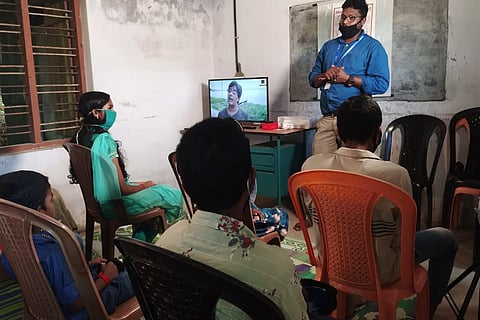

Ajay Kumar and his team at the non-government organisation for Dalits and Adivasis called RIGHTS noticed an unsettling trend after the Kerala floods of 2018 and 2019. School-going children living in remote and low-lying areas in Kerala, including Kuttanad in Alappuzha district, were able to go to school only months after classes resumed following the floods. “We thought of starting an online platform for students who have been out of school for some time,” said Ajay.
Even as the team was figuring out the logistics of setting up the online platform in January this year, the COVID-19 pandemic happened before they could finish. Despite delays and hurdles, RIGHTS managed to set up BHIM Online Classroom, an online programme for students from Dalit and Adivasi colonies across Kerala, in May. Under this programme, the team has set up 30 smart classrooms in various colonies, that include communicators, and android televisions screens with WiFi connection. Children can browse websites and access other online content, including the content the team has made.
These classrooms are communal, and volunteers associated with the RIGHTS team — college students to senior citizens — go to these colonies two days a week and assist the children in using the televisions, surfing the internet and helping them understand the content.
While the COVID-19 pandemic certainly posed challenges for BHIM Online Classroom, it also spurred on the RIGHTS team due to the underlying digital divide that it exposed. The divide even became a topic of discussion when the Kerala government started First Bell, its online programme for school students. So, in April, the RIGHTS team ramped up their efforts to set up an online platform to address the academic issues of students from marginalised communities, even before the First Bell programme.
“We have set up these televisions with internet connection at colonies in Malappuram, Idukki, Pathanamthitta, Alappuzha, Kollam, Thrissur and Thiruvananthapuram districts. We have established 30 such smart classrooms where about 1,000 children are directly benefiting,” Ajay, the Executive Director of RIGHTS, told TNM.
The process of setting up these classrooms came with its own set of challenges, such as sourcing educational content and ensuring internet connectivity, considering that these are remote areas where getting a good signal on the phone is a luxury.
Under the Kerala government’s First Bell programme, the televised content is based on the school syllabus and made by trained government school teachers. But RIGHTS, for its Bhim Online Classroom programme, crowdsourced academic content.
“The first question we encountered when we started the project was how to create a platform full of content,” said Ajay. “We made a public call, on Facebook and Twitter, asking volunteers to come forward and register with us as content contributors.”
Soon, engineers, software professionals, people from the merchant navy, PhD scholars and teachers, who have prior experience in teaching, registered with the team. They were asked to prepare videos based on state syllabus either in Malayalam or English in different subjects.
“The volunteers could choose a subject of interest or expertise. We also constituted a team to screen the content they prepare to ensure it is in accordance with state policies and with the available education frameworks,” explained Ajay.
The pilot project was started on May 25 for Class 9 and 10 students in tribal areas.
RIGHTS has uploaded more than 50 videos so far on the Bhim Online Classroom website. “Unlike a traditional classroom setting, where there is one teacher per subject, on this platform features videos by multiple contributors for each subject. We hope this website will be one of the largest platforms for educational content that people can access freely,” he said.
Besides creating content, the volunteers are also engaged in mobilising funds, ensuring these television sets and other infrastructure reach the village and instructing the students.
The team had earlier conducted a survey and found that about 60-70% of the Dalit and Adivasi population in Kerala did not have access to the internet.
“Although the internet penetration rate in Kerala is the second-highest in India, at 54%, residents in urban spaces have access to 3G connection, while those in rural areas are still struggling with 2G connection. So, it is not just the digital divide, but the quality of the access is also a big question,” noted Ajay, who is also a Dalit rights activist based in Thiruvananthapuram.
During this survey, the team also realised that apart from connectivity issues, these remote areas did not have electricity. After identifying such areas with poor power supply, the team set up smart classrooms enabled by the solar energy system to access the internet. There are also completely remote areas where internet connectivity cannot be facilitated, and so, the volunteers download the content into a pen drive and screen it for the students.
RIGHTS is further pushing the envelope to help students residing in villages where the internet can be accessed only at certain points. “We are developing software and hardware where residents in such areas can come to these points of internet availability, download all education contents, go back to the smart classroom and screen it,” said Ajay.
According to the team, the parents of these students from marginalised communities are yet to comprehend how the online education system works. “But they understand that this is inevitable moving forward and so they are extending all support to the children and our volunteers,” said Ajay.